Real estate social media marketing is about much more than posting pretty pictures and enticing videos to show off your new listings. Social media helps build your personal brand so you can showcase the real, unique value you bring to the home-buying and -selling process. (Not just the properties you have for sale right now.)
Social media is the top tech tool for connecting real estate agents with quality leads. On this front, social far outpaces brokerage and realtor websites, MLS, and listing portals.
Nearly all real estate agents in the U.S. (91%) are using social media in their businesses, and 70% said it has an impact. That’s great for the majority of agents, but what about that 21% who are using social and not seeing results?
In this post, we’ll show you how to get strategic with your real estate social media use to drive real business results like:
- more leads and referrals
- stronger repeat client relationships
- and, yes, more activity on your listings, too.
Key Takeaways
- Social media is real estate’s #1 lead-gen tool. With 91% of U.S. agents using social platforms and 70% seeing results, social media outperforms MLS and listing portals for attracting quality leads—especially when it’s used to build a personal brand, not just promote listings.
- Different platforms serve different goals. Facebook is best for reaching older, financially established buyers and sellers, Instagram leads in engagement (especially with women), TikTok offers untapped potential among future buyers, and LinkedIn drives referrals through professional networking.
- Effective content goes beyond listings. Top-performing agents use tactics like video tours, market updates, local spotlights, client celebrations, and behind-the-scenes posts to build trust, grow relationships, and stand out. They also use DMs, collaboration, and targeted ads to generate real business results.
The social network that will work best for you depends on what you’re trying to achieve. Looking strictly at engagement rates, Instagram comes out on top for the real estate industry.
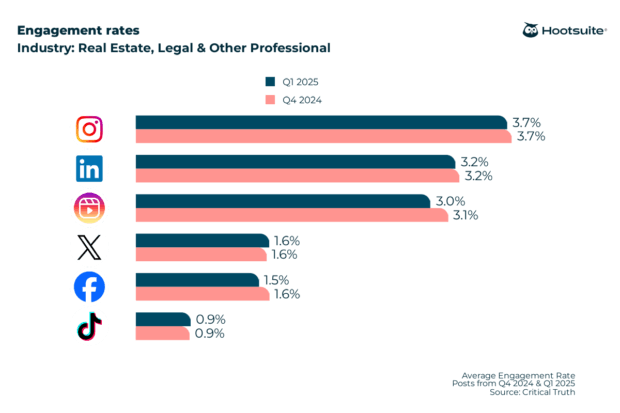
But you’re not using social media just to get engagement – you want it to help you win new potential clients and sell more homes. Here’s how each of the major social media platforms can help you reach those goals.
Facebook is best for
Showcasing current listings and reaching people actively thinking about buying or selling a home.
Why it works
The most recent data from the National Association of Realtors (NAR) shows that home buyers and sellers are firmly within the Facebook demographic.
The median age for a home buyer is 56 years old, and that of a home seller is 63. Pew Research data shows that 70% of Americans aged 50 to 64 use Facebook. It’s by far the most commonly used social network for people in this age group. The Facebook demographic is also financially well established: It’s the most commonly used platform for people with an income of $70K+ per year.
Benchmark data
The best time to post on Facebook for engagement for real estate, legal, and other professionals is generally between 8 a.m. and noon.
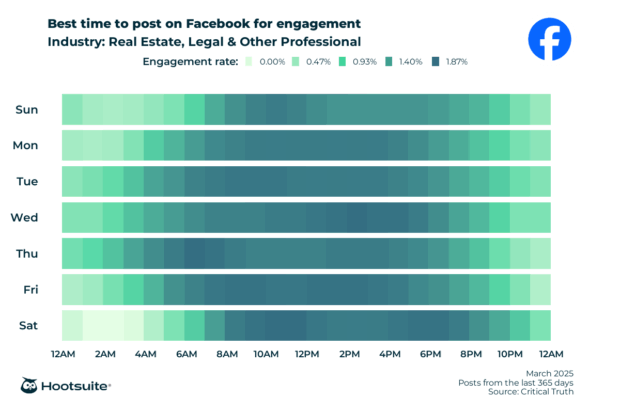
The best type of content for realtors to post on Facebook is albums, with a 2.9% engagement rate. That’s not surprising, since albums give you the chance to show off a listing in great detail. Photos are next at 1.5%.
What’s interesting is that status updates actually get a slightly higher engagement rate than videos on this platform: 1.1% compared to 0.9%. A photo gallery looks like a better option for highlighting different areas of a listing than a video on Facebook.
Note that links get the lowest engagement at 0.6%. Rather than linking out to a listing, provide all the necessary information within the post itself and encourage viewers to connect.
The average weekly follower growth rate for real estate, legal, and other professionals on Facebook is 1.6%, and the average weekly posting frequency is 11.6 posts. Real estate agents may actually be posting too often on Facebook. The highest engagement rates happen when these accounts post 2 to 4 times per week.
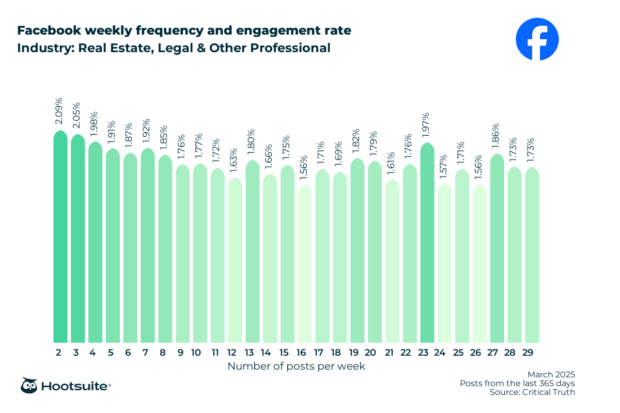
Instagram is best for
Driving engagement.
Why it works
Instagram has the highest engagement rates for real estate content. That makes it an effective tool for getting attention for current listings and building relationships by growing your follower base.
An interesting factor to note when planning your content calendar: NAR data shows that 20% of recent buyers were single women, compared to just 8% who were single men. Instagram’s U.S. user base also has more women (55.4%) than men (44.6%)
Benchmark data
The best time to post for engagement for real estate, legal, and other professionals is generally very early in the morning (before 7 a.m.!) or in the late afternoon.
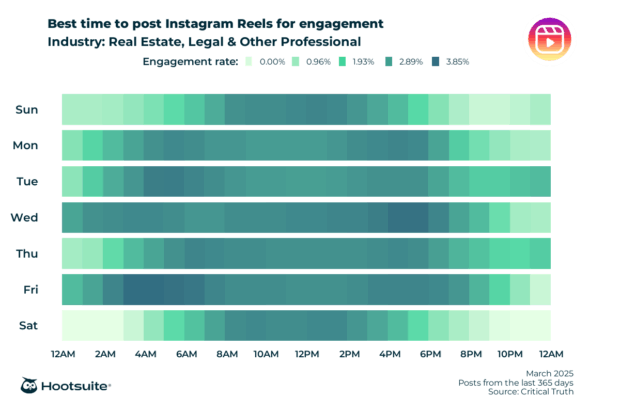
The best type of content for real estate agents to post on Instagram is carousels, with a 4.1% engagement rate. Photos are next at 3.5%, followed by Reels at 3.0%.
The average weekly follower growth rate for real estate, legal, and other professionals is 0.97%, and the average weekly posting frequency is 8.6 posts. Again, real estate agents may be posting too often, as the highest engagement happens when these accounts post 2 to 6 times per week.
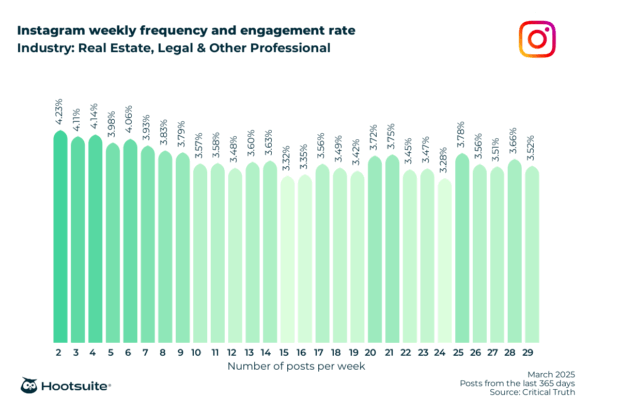
TikTok
TikTok is best for
Reaching first-time buyers and future buyers.
Why it works
TikTok is most popular among those aged 18 to 29, followed by those aged 30 to 49.
For now, Gen Z makes up just 3% of buyers and 2% of sellers, but they are building their real estate knowledge. Young millennials already make up 12% of home buyers. And the average first-time home buyer is 38.
Only 15% of U.S. real estate agents currently use TikTok in their business. (Compare that to the 87% who use Facebook and 62% who use Instagram.) That gives you a chance to get established on this platform with very little competition – if you start now.
Benchmark data
Fridays are the best day for engagement for real estate, legal, and other professionals on TikTok.
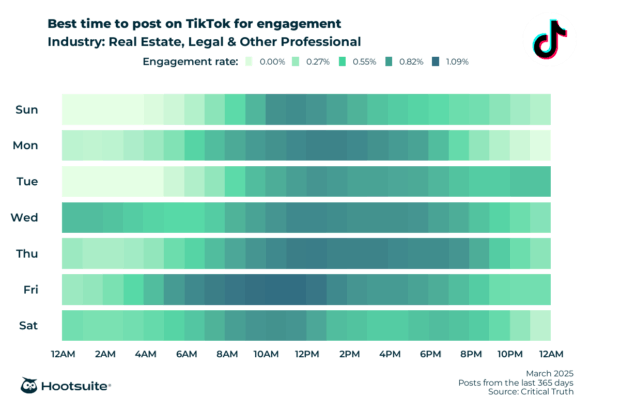
TikToks in the real estate, legal, and other professional industries get an average 0.9% engagement rate.
The average weekly follower growth rate for real estate, legal, and other professionals is 1.62%, and the average weekly posting frequency is 3.1 TikToks. We don’t have specific data for the real estate industry on the correlation between posting frequency and engagement rate on TikTok, but overall, the optimum number of posts is 13.
So, unlike on Facebook and Instagram, real estate agents may want to increase their posting frequency on TikTok to maximize engagement.
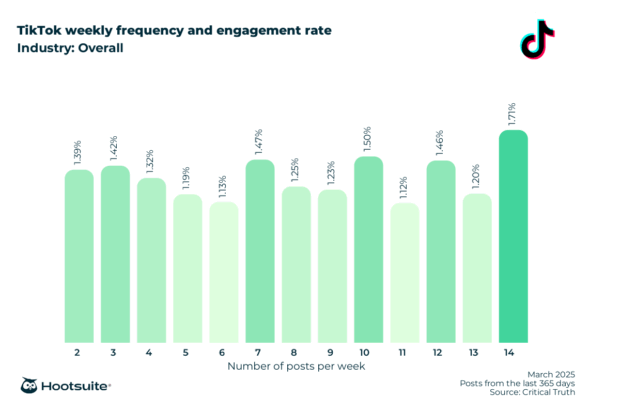
LinkedIn is best for
Building (and maintaining) professional networks that drive referrals.
Why it works
The stronger your professional network, the more chances you have to get a referral. This is a big deal: 40% of all buyers and 51% of first-time buyers found their real estate agent through a referral. For sellers, 66% used an agent that was referred to them or that they had used before.
Benchmark data
Real estate, legal, and other professional posts see most of their engagement on weekdays, with spikes of high activity around lunchtime on the weekends.
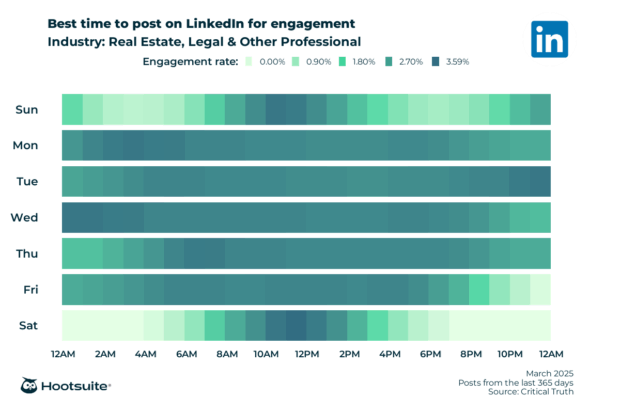
The best type of content for realtors to post on LinkedIn is videos, with a 4.0% engagement rate. Photos are next at 3.3%.
Status updates don’t get a lot of engagement for realtors on LinkedIn: Just a 1.6% engagement rate. Links actually get higher engagement at 2.1%.
The average weekly follower growth rate for real estate, legal, and other professionals is 0.9%, and the average weekly posting frequency is 5.4 posts. Posting frequency does not have a clear effect on engagement rate for LinkedIn, as the rate moves up and down in a way that makes it tricky to make a call about what’s best.
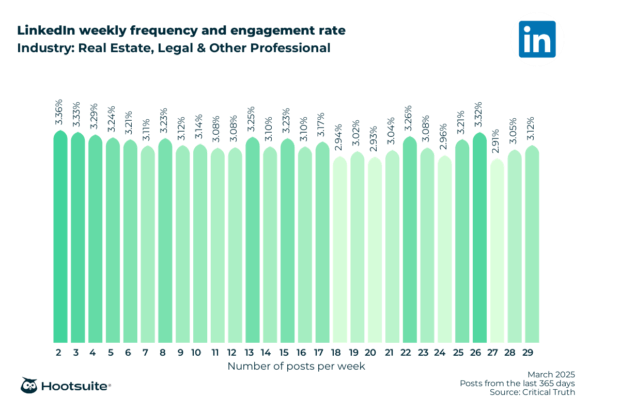
We’re pretty sure you’re already posting your current listings on social media, so we’re not going to include that as a tactic here. Instead, we’ll look at more strategic ways to use your online presence to support your real estate business, grow your client list, and sell more homes.
1. Build a consistent brand
Brand awareness is important in any industry, but especially in real estate, where client–agent relationships are built on trust. But branding isn’t just about your logo, font, or colors. It’s about knowing your values and exuding them online.
Oakwyn Realty uses their motto of “work hard, stay humble” as a consistent theme in their social posts. When the firm’s agents participated in a softball tournament, the motto was on their jerseys. Showing the agents having fun as a team was a great way to drive the motto home while highlighting the real people behind the brand, too.
2. Prioritize relationships and community
The primary goal of real estate social media should always be relationship building. Engage with your followers. Respond promptly and courteously to comments and messages.
Vancouver realtor Tyler Burrows has built a full TikTok channel of high-quality video home tours that get thousands of views – and plenty of comments. He’s fully engaged with his audience, responding to every one.
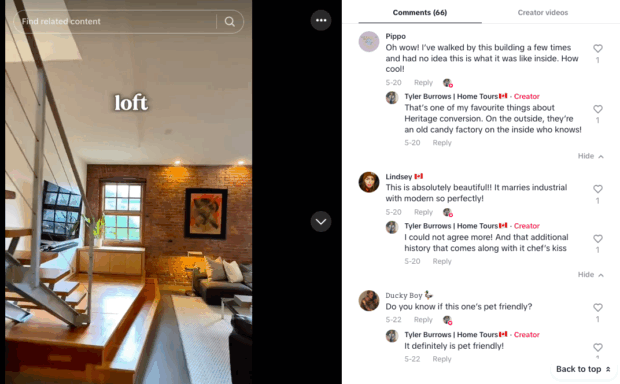
Source: @thetylerburrows
What’s interesting is that Tyler is not the listing agent on many of the homes he showcases, but of course, he can still help anyone who’s interested in buying these homes. Every video helps build his relationship with his followers, too.
Tip: Hootsuite Inbox can help you stay on top of all your social media comments and DMs, all in one place.
3. Lean into video
You saw above that carousels have higher engagement rates than videos on Facebook and Instagram. But in real estate, engagement is not necessarily the most important metric. If you’re looking to extend your reach and visibility, short-form video (like TikToks and Instagram Reels) is tough to beat.
Tampa-based realtor Breanna Banaciski takes a very unconventional approach to real estate social media, but it makes her 125,000 followers love her. Her videos regularly get hundreds of thousands to a million-plus views, and thousands of comments.
Like Tyler in the example above, Breanna creates videos for many homes where she is not the listing agent. She’s developing a personal brand so she’s the first person her followers call (or, more realistically, DM) when they are ready to buy or sell.
4. Highlight your local area expertise
Home purchases often come with a move to a new neighborhood. They may even mean moving to a whole new city, state, or country! In this case, it’s particularly important for real estate agents to understand the areas they represent.
Consider posting about local events, neighborhood hangouts, new restaurant openings, festivals, museums, sporting events, and more. Your audience will appreciate social media content that has a personal touch and gives them insights into their new hometown.
Arlington, VA, real estate advisor Gabrielle Witkin regularly shares her favorite things about her city, and even created a local’s summer bucket list guide.
5. Show your work behind the scenes
Not everyone knows exactly what real estate agents do – or why they’re such an important part of the home-selling process. Letting followers in on some of the work you do behind the scenes helps show the value of hiring an agent. It’s also an opportunity for some comedic relief.
6. Celebrate your clients’ success
Buying or selling a home can feel like a major challenge for people who are already dealing with the stress of a move. Showing happy clients who have successfully navigated the process makes it all seem a little more manageable.
Vancouver realtor Lindsie Tomlinson shares “possession day” posts showing featuring clients on the day they get the keys to their new home.
In the captions, she often includes details about how she helped her clients find their dream home, whether that’s simply looking at a lot of listings to find the right one, or helping clients avoid a purchase in a building with potential issues.
7. Collect testimonials
While brands in other industries can share user-generated content to create social proof, that’s a little trickier for real estate agents. That makes testimonials a powerful asset for agents to build their reputation on social platforms.
Always be sure to ask your clients for permission before posting their testimonial. For more eye-catching visual appeal, give it a basic graphic design treatment rather than using simple text.
8. Tell great stories
Here we’re talking about telling stories, not posting Instagram Stories. That is, we’re suggesting you look for ways to incorporate storytelling principles into your social posts.
This won’t work for every listing. (A new-build condo, for example, may not have a compelling story to tell.) But when there is something interesting about a property, take the time to get that story out there.
For example, this small, pie-shaped house in Seattle might not immediately seem like a hot property. But the home’s history as a “spite house” gained plenty of attention on both social media and conventional news channels, and the home sold in just two weeks.
9. Provide market updates and context
For many people, real estate is a black box. It can be intimidating if you don’t really understand the process or the market.
Agents and brokers can use social media to demystify real estate with educational content. Talk about market trends, or offer advice on how to get ready for a home purchase or sale. This will help build trust, and can also be a useful way to set expectations when talking about pricing, listing, and bidding strategies.
10. Highlight home decor and DIY trends
Home decor is a popular topic on many social media platforms, and it’s a logical trend for real estate professionals to hop on. From home staging ideas to DIY projects that improve the value of a home, there’s plenty of ground here to provide content that entertains and keeps your followers engaged.
Toronto-based real estate sales rep Miranda Caldwell has built a TikTok audience of more than 400,000 by combining her real estate expertise with her love of design.
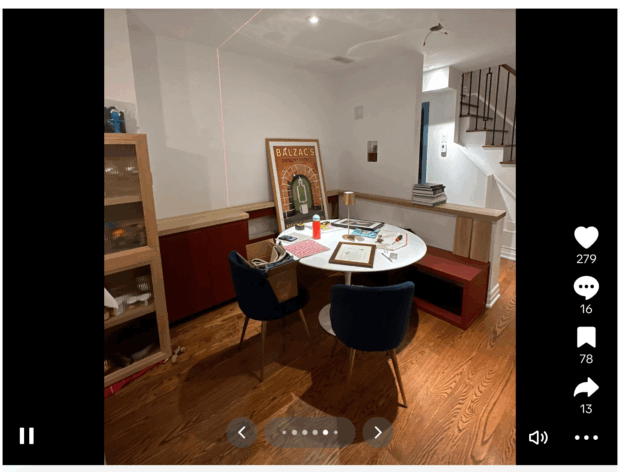
Source: TikTok
11. Build your email list
Social media followers are great, but your own subscribers are even better. Try creating a resource like a checklist, guide, or detailed market report that you use for lead generation. Tip: Automated DMs are a great way to put this into practice on Instagram!
Spokane, WA, realtor Alyssa Curnutt uses automated DMs on Instagram to collect leads with resources like her guide to Spokane’s best brunch spots.
12. Post your weekly open houses on a set schedule
Consistent posting trains your followers to expect content from you on a specific schedule, and even to seek it out if the algorithm doesn’t deliver it to their feed. Open houses are definitely a topic of interest for those thinking about buying a home.
Next Move Property in SIngleton, Australia, posts a list of their open houses every Friday. This is a great resource for potential buyers looking to plan their weekend real estate viewing.
13. Collaborate with relevant professionals
You’ve already seen one form of collaboration in this post: Realtors creating video tours highlighting properties for which they are not the listing agent.
But given the number of professionals required to complete a real estate transaction, there’s lots of room to collaborate with other relevant people in your local area, too. Think about staging companies, mortgage brokers, appraisers, photographers, and videographers. Also consider service providers that can help make the move itself easier for your clients, like movers and cleaners.
These connections can make life simpler for your clients. Showcasing them on social media shows your commitment to the whole process of moving homes, not just making the sale. Partnering on social media is also a good way to expand the audience for both you and your collaborators!
14. Test targeted social ads
One of the biggest benefits of having a digital marketing strategy for real estate is the ability to boost your efforts with paid social media. Not only can strategic investments get your content in front of more people, but you’ll be able to target your best customers directly.

Source: @danaharperrealestate via Meta Ad Library
Set targeting parameters by location, age, demographic, and interests to ensure everything you post is seen by the most qualified audience.
Hootsuite Ads lets you manage paid campaigns across networks with ease. Plus, build comprehensive reports that show you what’s working, what’s not, and where you should target next.
Bonus: Get a free social media strategy template designed specifically for real estate agents, brokers, and marketers. Use it to easily plan your own strategy, track results, and keep your team in the loop.
Ready to level up your social presence to bring in new leads on autopilot? Use Hootsuite to schedule, publish, and analyze your content and stay on top of DMs across all your platforms—from one dashboard. Try it free today.







